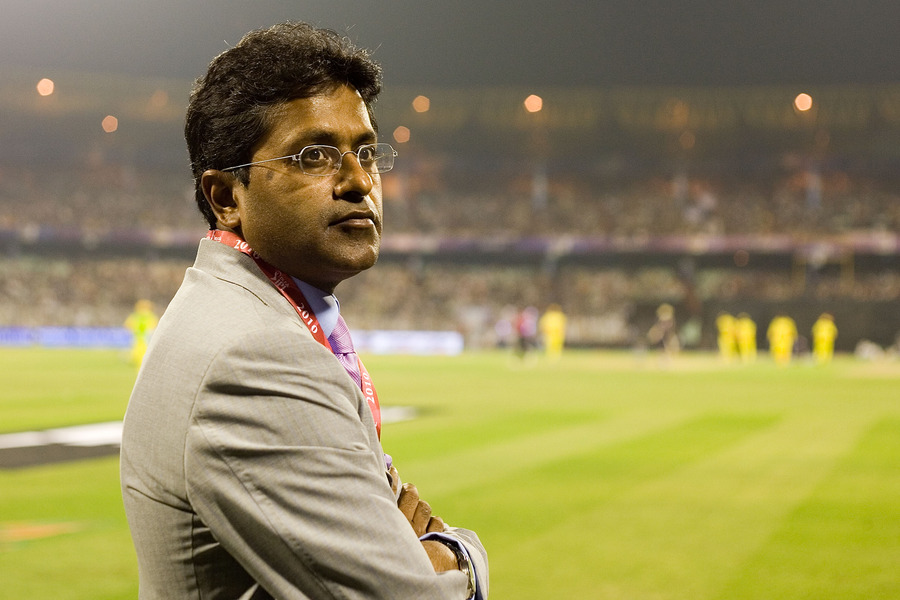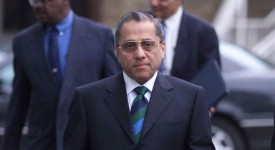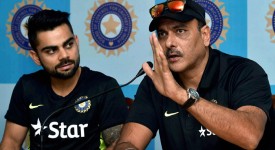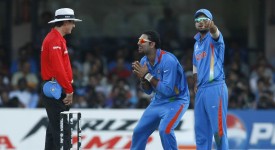Lalit Modi is at the center of a storm again
Lalit Modi, the former IPL chairman, has made several claims about procedural irregularities in the BCCI and IPL, including cases where he faces legal action. Modi’s statements, made to the India Today TV channel, were in response to a growing controversy also involving India’s foreign minister Sushma Swaraj, after it appeared that she helped him secure documents to travel out of the United Kingdom, where he has been living since 2010.
The claims have also pointed to the close links in India between cricket and politics, with several of India’s senior ministers holding top positions in the BCCI for the past few decades.
Modi left India after the 2010 IPL, around the same time the federal finance ministry launched several investigations into IPL-related issues. In 2013, Modi was expelled for life by the BCCI after a disciplinary committee found him guilty on eight counts of indiscipline and misconduct. That committee was headed by Arun Jaitley – who is now the country’s finance minister and the man whose department is investigating Modi.
Those investigations led to Modi’s passport being revoked by the Indian government, essentially confining him to the UK. According to a story published by Sunday Times on June 14, Modi had last year sought a certificate of travel from the British government to travel to Portugal, where his wife was due to undergo surgery. The British government refused the certificate on the grounds that Modi was effectively a fugitive from Indian law, but acceded after Swaraj’s assurance that India had no objections to Modi travelling.
This led to Modi obtaining the certificate and travelling to Portugal. Within days, he won a case in India to have his passport revocation overturned and he is now free to travel on the strength of that passport.
However, Swaraj’s decision to help Modi – which she said was on compassionate grounds – has created a storm in India on several counts. One of them is that Modi was, at that point, effectively a fugitive against whom the Indian government had several cases. Another reason for controversy is that Swaraj’s daughter is Modi’s legal counsel in the cases, and the minister’s intervention was at the very least a conflict of interest. Other sticky points include whether Swaraj’s ministry went through the finance ministry in approving Modi’s request, and whether her action was a quid pro quo for Modi helping her nephew with a university admission in the UK in 2013.
Modi has had a fractious relationship with India’s politicians, who have over the past few decades controlled the BCCI. The imminent cause of his fall from grace was his decision to take on a junior minister in the then Congress government, Shashi Tharoor, over the sale of IPL franchise rights to what became the Kochi Tuskers franchise.
In his interview on Tuesday, Modi said the BCCI’s disciplinary committee, which investigated allegations of financial irregularities and subsequently recommended his ban, indicted him without giving him a fair opportunity to present his case. “That committee didn’t let me come on air,” Modi said. “The day I was supposed to come on air and go on to trial with them, that’s the day when they decided to end the committee.”
He also said N Srinivasan’s office excluded him from all financial activities pertaining to IPL 2009, which was moved to South Africa and later came under the scanner of the Enforcement Directorate (ED) of India’s finance ministry for contraventions of the Foreign Exchange Management Act.
“(Arun) Jaitley was part of the process of moving it to South Africa. So was Mr. Srinivasan. So was Mr Jyotiraditya Scindia. So was Mr (Sharad) Pawar. I was just a member of that committee. The decision was taken by the committee.
“I have said the BCCI was wrong in the way they operated the financial accounts in South Africa. That’s the basis on which the ED has penalised the BCCI for Rs 1600 crore.
“It is my reply to the ED which says very clearly that (then BCCI president) Shashank Manohar proposed that the BCCI should open accounts in South Africa subject to RBI approval. I was excluded by Mr Srinivasan’s office in their financial process.
“He said in writing, ‘I am deciding how the bank accounts will be operated, and I will decide how the money will be transferred.’ He made a committee – and this is the core connection – and he decided not to take the Reserve Bank of India’s approval, and decided on that basis to transfer money out. I had no role to play in that and I have shown clearly in my documentation to that effect.”
Source: © ESPN Sports Media Ltd.





